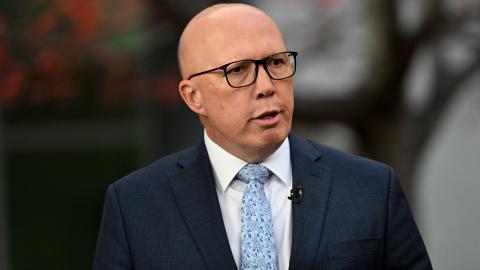Anthony Albanese claims he is better placed than Peter Dutton to work constructively with Donald Trump as he has established good relationships with Asian leaders. Canada’s Justin Trudeau had good relationships with Western European leaders but that didn’t stop Trump trolling him mercilessly and threatening Canada with tariffs.
Dutton countered that it was “comical” for Albanese to run this line. He is correct. One wonders why Albanese went there in the first place.
Unlike with the Coalition, there is a huge gulf between the Labor government and the incoming Trump administration on personality, policy and values.
Who is better placed and how best to deal with Trump is an important question. The world can’t stop talking about him because he will be disruptive and transformative in his second term. Whether it is for better or worse depends on one’s perspective. This gets to the point of why Albanese and not Dutton begins at a disadvantage.
It is clear from my interactions with some Trump nominees across several years – two of whom are nominees in his national security cabinet, one for a senior defence role, and another a personal adviser to him in the White House – that Australia does get outsized attention at the highest levels. It is a problem for Albanese.
I was in Washington when reports of Kevin Rudd’s derogatory comments about Trump surfaced. The current conversation is whether Rudd will hold on to his ambassadorial role. What Trump thinks about Rudd is less important than what he thinks about our Prime Minister and his government. Shortly after the Rudd comments emerged, I was shown a sheet of paper by a loyal Trump adviser with degrading comments made in the past by not only Rudd but also Albanese and some of his ministers. I was subsequently informed those comments were shown to Trump.
Trump’s capacity to hold grudges and exact personal vengeance is well known. Put that aside as he has more burning personal targets than the Australian Prime Minister. The problem is how Labor’s denigration of Trump was interpreted.
According to some of Trump’s closest advisers, the Labor denigration is no different to the snobbishness and nastiness of elites in the Democratic Party seeking to brand Trumpian perspectives as stupid, illegitimate, and even evil. Hillary Clinton notoriously referred to Trump supporters as belonging to a “basket of deplorables” and the Labor comments are seen in the same light.
As Albanese is arguing in claiming he can best manage Trump, strong positive connections at the highest levels of power have enormous implications. In this sense, Albanese begins from an awkward place. What about policy and values? On many issues of substance separating Labor and the Coalition, Trump is likelier to side with Dutton rather than Albanese.
Several of the individuals about to play a key part in the Trump administration have cast doubt or heaped scorn on Albanese’s outsized reliance on renewables and rejection of fossil fuels and nuclear as critical sources of power. Allowing unions such an influential role in shaping Labor’s industrial relations policies has been critically noted. Albanese’s approach to Israel and the Middle East has come in for scathing condemnation. The Prime Minister’s formula of “co-operating where we can, disagree where we must, and always engage in our national interest” when dealing with China is seen by key Trump nominees as cover for a timid approach that merely avoids rather than manages difficulties in that relationship.
Moreover, Trump and his inner circle are filled with individuals who loathe identity politics and related diversity, equity and inclusion policies. Albanese’s advocacy for the voice for Indigenous Australians was seen as an extreme consequence of this mindset. It simply did not make sense to Trump’s Republicans – and to many Democrats for that matter. The point is that on most policies and values that divide Labor and the Coalition, Dutton is much better positioned to find common ground with Trump.
There are elements that will be difficult for Albanese or Dutton to deal with. Trump’s inclination to disrupt extends to breaking or weakening institutions and conventions that he believes are not in his interest. Sometimes it will be to further narrow US interest and other times necessary for the greater long-term good, including ours. For example, his criticisms of global economic rules and China’s exploitation of them are valid.
Trump wants to change the structure of global production. Our problem is that as a commodities exporter we benefit disproportionately from China’s state-directed political economy based on unhealthy levels of fixed investment and over-production.
Or consider Trump’s demands that allies pay and do more. This is necessary for the future of a healthy alliance system but means pain and sacrifice for whoever is in the Lodge.
In any event, Trump might not make political life easier for Dutton. But it does seriously complicate things for Albanese.




















